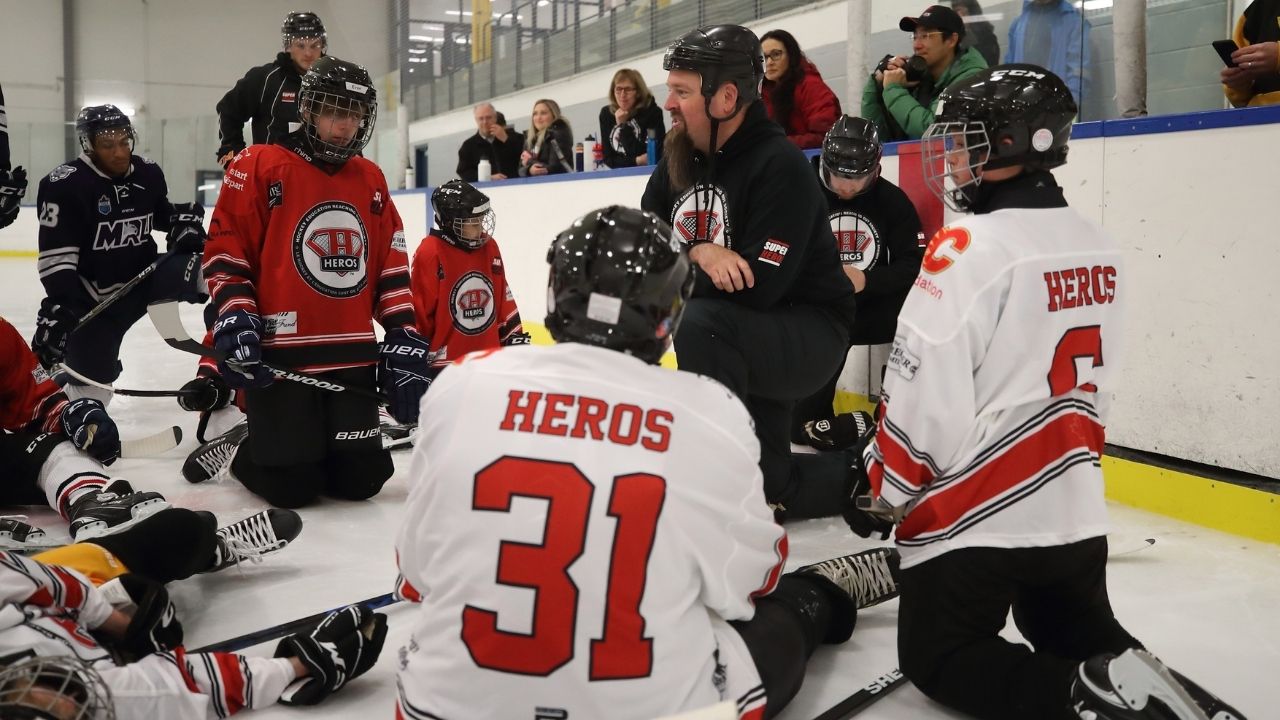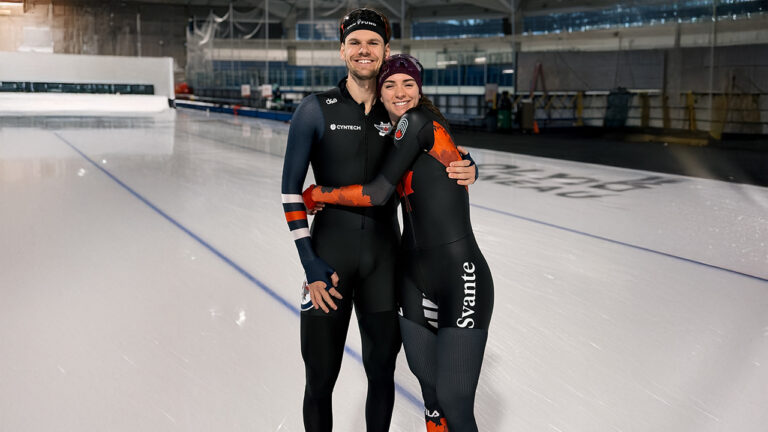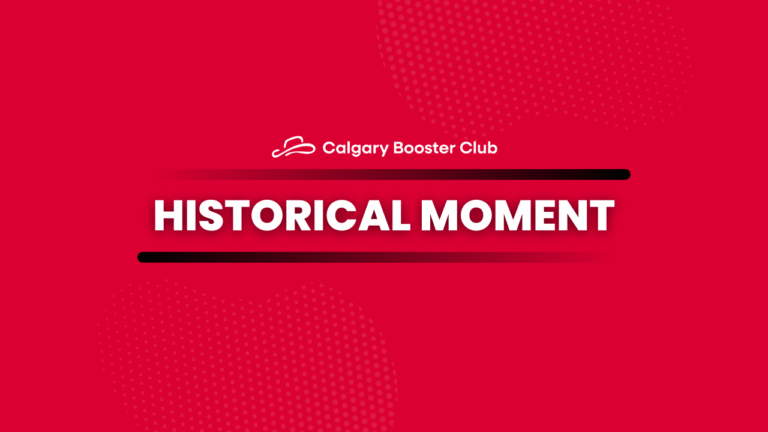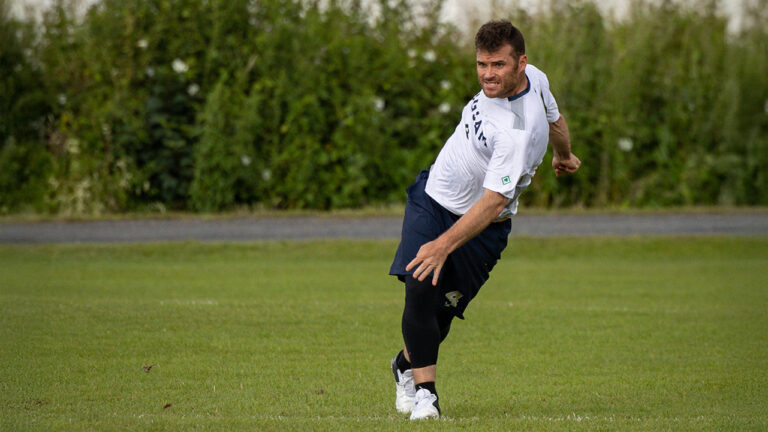Photo credit: Courtesy of HEROS.
The boy is in his mid-teens, good-natured and broad-shouldered.
He likes — not loves — the game of hockey, despite attending a school that is one of the sport’s hotbeds.
Changing gears one winter, he begins to lay the groundwork for an award-winning career. Not that the initial shove toward his life’s work had been his idea.
Kevin Hodgson, more than 30 years later, relects on that pivotal sequence.
Enrolled at the famed Athol Murray College of Notre Dame in Wilcox, Sask., he had just missed the glory years of Curtis Joseph and Rod Brind’Amour. But standards for Hounds hockey remained high, which Hodgson soon discovered.
“That’s where I found out how good I wasn’t,” he said, chuckling. “That was the late-80s, so you were good or you were big. I had the big part down pat, but not the talent part. Then you get to a place where everyone is good and big.”
So it was, on the day of the opening of the provincial playoffs, Hodgson got pulled aside by his Bantam AA head coach. The message to the burly winger was painfully simple — you will not be suiting up for these games because they are important to us.
“I wasn’t as upset as I should’ve been,” said Hodgson. “Guys that go on to major junior, that would be a defining (turning point), right? But I was like, ‘Oh. OK.’ I remember vividly at the time that I wasn’t that bothered.”
The skipper’s lecture was far from over. He told the lad that he envisioned a different direction for him — one in which Hodgson ensures that others have fun playing hockey “rather than you being really good at it.” Presumably, this jolt had been met with another shrug.
“But he saw enough to hand me a whistle and tell me to look after his kids,” he said, “so there had to be something to it.”
Because that was to be Hodgson’s new role — coaching the children of Notre Dame’s staff members. At 14, he was suddenly in charge of a bunch of pre-teens.
That very day, Hodgson ran his first practice. Despite inexperience, the transition was smooth. He helped the kids shovel the ice, something coaches generally didn’t do. Then he conjured up a pile of creative, albeit unorthodox, drills.
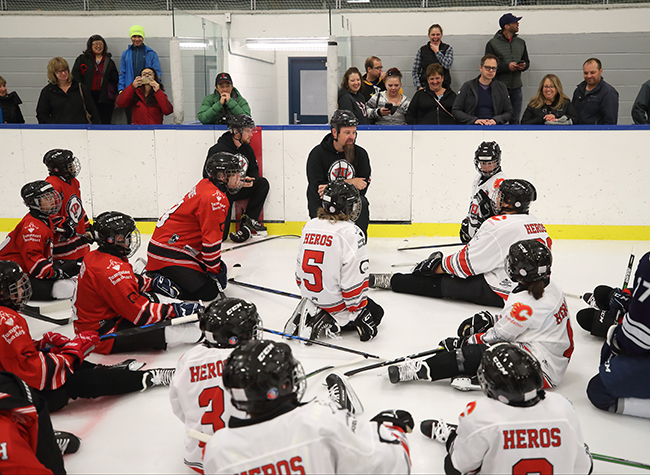
Everyone, including him, seemed to get a kick out of the session.
“An old-school hockey guy would’ve looked at me and said, ‘You’re an idiot,'” said Hodgson. “But if kids are laughing, they’re going to get better. I was never going to teach anybody to get to the next level — that’s not my schtick.
“At Notre Dame, you don’t play for fun. You play to win, right? So it was nice to be around kids just playing for fun.”
The game’s grindstone never did appeal to him. Earlier that season, the Hounds collected a road win— but played crummy. On the way home, the coach ordered the bus driver to stop five kilometres from town. Out went the players, hockey bags over their shoulders. “Middle of winter, blowing snow, gravel road.” They started marching.
“There were two guys who were loving this, they were leading the charge,” said Hodgson. “When we got in sight of the rink, we could see the doors were open. That wasn’t a good sign. If the doors were closed, it meant the coach went home to bed. But the door was open, so you knew what was waiting for you — we had to put our gear on and go skate. This is like two in the morning.
“But those same two guys could not have been happier … they ended up playing in the Western Hockey League. But that wasn’t me.”
Perhaps not, but Hodgson had been on his own path to discovery — learning how to squeeze the most out of hockey.
Now, he is an expert in the field. And there’s hardware to prove it.
Winner of the NHL’s Willie O’Ree Community Hero Award as the driving force behind the HEROS (Hockey Education Reaching Out Society) — off-ice guidance and free hockey programming for vulnerable youth — Hodgson was singled out three months ago.
It’s worth noting that one year earlier the prestigious trophy had gone to another Calgarian. After the recognition, Dampy Brar — cofounder of APNA Hockey, an organization focusing on inclusion — told the Calgary Herald: “Hockey’s not just a sport. It’s about self-esteem, self-confidence, work ethic, problem-solving and resiliency. It’s about respect for team, for the game, for gender and for culture. It’s not just about coaching hockey, but life skills as well.”
Which is a stance that Hodgson would loudly applaud.
But good luck trying to hoist the man onto a pedestal. He’s simply not interested.
“I try to stay invisible,” Hodgson said the other day, relaxing in his backyard in the southeast community of McKenzie Towne. “Winning this thing has killed me.”
Yet inspired countless others.
Based in a dozen centres across Canada — and bent on improving the lives of hundreds of boys and girls — HEROS deftly removes the barriers to playing hockey.
For Hodgson himself, it’s added up to a remarkable journey. From bantam-aged healthy scratch to middle-aged difference-maker, with a profile in the game that’s beginning to blossom. (Barry Trotz texted the morning of a New York Islanders’ playoff game to congratulate him on being named a finalist for the award.)
“I’m not a hockey guy. I don’t get excited about the high-performance stuff,” Hodgson said. “I’m more excited about this — what hockey does for people. Our organization is really good at using the best parts about hockey to make sure that kids can be successful whenever they stop playing, whether that’s at 14 or 40 or whatever.”
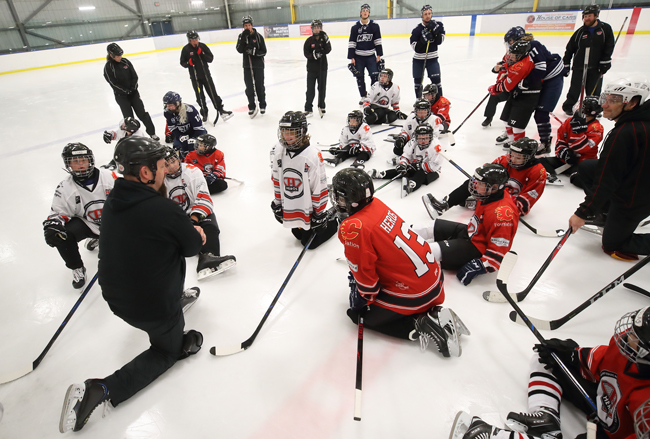
Enjoying himself, Hodgson coached the staff’s children for his final two years at Notre Dame.
Graduating and returning to Calgary, he leaned into his post-secondary studies.
Or, at least, that was his hope. He had a couple of false starts in Mount Royal College’s business program, flunking out twice with what he claims was grade-point average of .80. “It just wasn’t my thing.”
Hodgson began work as a landscaper, a job that included wintertime care of the rinks on McKenzie Lake. Then one day, he and the tractor fell through the ice. “Right behind Theo Fleury’s house, actually — and I got rescued by these two guys.”
The close call prodded Hodgson. “I said, ‘I got a second shot here.'” With fresh vigour, he decided to pursue an education. But in what?
He grabbed Mount Royal College’s course calendar and handed it to his then-girlfriend-now-wife Kristie. His instructions? Start fanning through the book and when he says stop, stop — let fate determine the future.
Kristie flips, he hollers, she halts. “I said, ‘What is it?’ She goes, ‘Well, the left-hand page is Secretarial Arts.’ I said, ‘Oh, shit. What’s on the right side?’ She said, ‘Social work.’ I applied the next day.”
Putting in the work, walking away with a diploma in 1997, Hodgson got hired by a private social-service agency.
Then arrived another one of those funny-the-way-life-works moments.
Norm Flynn — founder of HEROS, which was already established in Vancouver and Toronto — made a presentation to the Calgary Board of Education in the hopes of a landing spot.
Hodgson wasn’t there that day in 2006, but a coworker had been present. She absorbed the pitch and relayed the upside. “I go, ‘That sounds really cool,'” said Hodgson. “And she goes, ‘I’m glad you said that because I signed you up to volunteer.'”
Her hunch had been bang-on.
Immediately, HEROS and Hodgson were a fit.
“I dove in head-first,” he said. “What I’ve fallen in love with — we use hockey to make these kids believe that anything’s possible.”
On the afternoon of their weekly hockey session, children are picked up at school by a cab or a bus, then ferried to the rink where their gear, provided by HEROS, is stored. “There’s food waiting for them because a lot of our kids go hungry during the day.” Following their ice time, they are transported home.
“We make it really, really easy for them,” said Hodgson. “It’s the equivalent to taking a rink on the back of a truck to their house.”
Nominated by their schools or social-service agencies, players can stay in the program as long as they wish. Not surprisingly, there’s an 80 per cent return rate. Some people would like to see more turnover — enrolment in Calgary is limited to 32 — but the aim is maximum impact.
“We’re happy going 100 feet wide and a mile deep as opposed to a mile wide and 10 inches deep,” Hodgson said. “You’ve got to be willing to invest time if you want to affect change.”
In three years’ time, a new branch of the operation — SuperHEROS, for youth living with physical and cognitive challenges — has gone from one to three groups in Calgary. The program, now set up in Edmonton and Regina, will soon expand to Blackfalds, Alta., and Vancouver.
These sessions feature 24 players and 18 volunteers. Being as accommodating as possible means there’s a different look to these ice times, according to Hodgson. “It’s like 24 individual practices.”
With adaptive devices, wheelchair-bound players can take a crack at stand-up hockey — if that’s what they want. Because, for SuperHEROS, structure is up to them.
“I’ve watched a kid stand and shoot pucks for an hour at one particular screw on the boards,” said Hodgson. “Then when they get off the ice, they’re dripping sweat, and they say, ‘That was the best day of my life.’ Who are we to say that’s not hockey?”
Yet not everyone embraces the approach.
Like the highly qualified coach, who, at his first HEROS practice, blew the whistle and ordered the players to stand on the red line. The group scattered.
“But they were on a red line — the ringette line, the hashmarks, the goal line, the faceoff dots. The kids were just looking for a line made of red,” explained Hodgson. “He goes, ‘This isn’t going to work.’ And I said, ‘You’re right. Thank you for giving it a shot.'”
Another time, Don Cherry — hours after watching the HEROS skate as part of the NHL Heritage Classic’s outdoor festivities — offered his opinion: “That was the biggest bullshit practice I’ve ever seen. You’ve got to work on skating and stickhandling and shooting.” Hodgson laughs. “We just went, ‘Great to meet you, Mr. Cherry. Have a great evening.'”
Because, plainly, there is no intent to serve as a feeder system.
That’s missing the point.
Hodgson will never forget a tearfully appreciative mother telling him about her son. All he ever wanted to do was try on equipment at Sport Chek. Then he would always ask her why he couldn’t play. “She didn’t want to say, ‘Because you’re disabled,'” said Hodgson, “so she just stopped taking him to the malls that had Sport Cheks and stopped driving down roads where you could see Sport Chek.”
The boy joined SuperHEROS. “He got to go in, try on all the gear, and, a week later, carry his bag into the rink and say that he’s a hockey player. That kind of stuff really matters to these families.”
Off-ice stuff is important, too. Exposing the students to everything from cooking classes to job-shadowing to book clubs to tours of Calgary’s post-secondary institutions.
Facilitating that experience is vital.
“You can’t be mad at them for not having dreams if you haven’t shown them what’s out there,” said Hodgson, adding that they’ve handed out $250,000 in scholarships over the years. “If we lay 10 or 20 pathways in front of them, they’re more likely to choose one.”
His own pathway changed dramatically in 2012 when he was named executive director, one of only two full-time gigs at HEROS.
There is no plush office, no headquarters. His kitchen table is the base of operations and, nine years later, it remains a gripe-free zone.
“It’s perfect,” said Hodgson. “I get to write policy, I get to make sure we have funding, then I get to go play with kids.
“I’ve got the best job in the entire world — I really think that.”
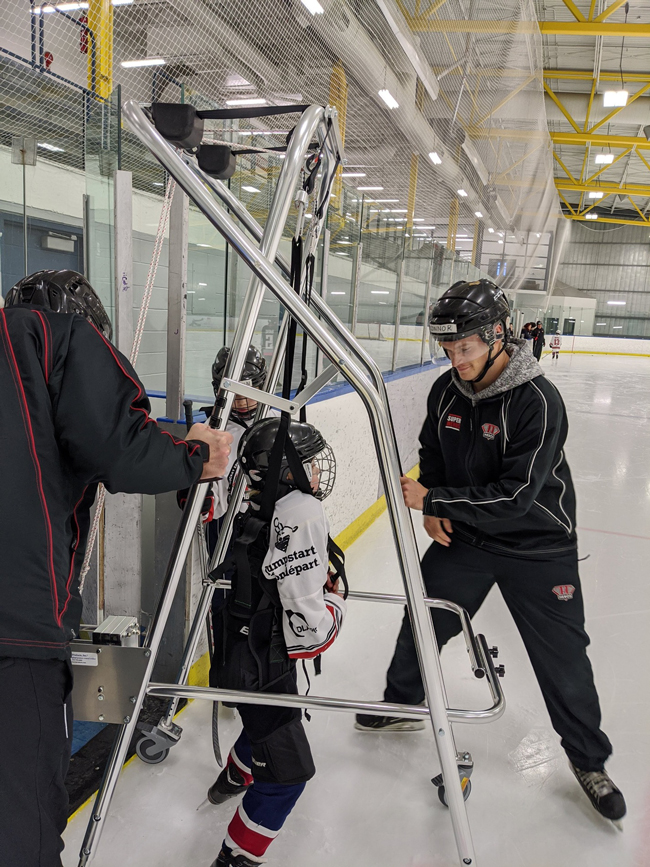
It was a little girl in Edmonton who had the bright idea — let’s nominate Kevin Hodgson for that NHL honour.
In May, Hodgson learned he was one of 10 finalists for the Willie O’Ree Community Hero Award.
Later in the month, he was part of a three-candidate shortlist — with Renee Hess, founder of Black Girl Hockey Club, and Howard Smith, co-founder of Pittsburgh I.C.E. (Inclusion Creates Equity) — a development that was blasted out on the NHL’s social-media platforms.
Hodgson may be outgoing — and instantly recognizable with his shorn head and six-inch goatee — but the ensuing publicity was not his comfort zone. Because none of this occurs without their collection of reliable volunteers, 300 strong across Canada.
“The kids are the star of the show,” said Hodgson, “but the volunteers are the magic.”
To illustrate, he’s got a handy story.
Mount Royal University women’s hockey players donate their Sunday mornings to SuperHEROS. But one night, after a Saturday road game, they got back to Calgary at 3:30 a.m.
“I pull up to the rink at 7:30, it’s minus-40, they’re huddled in a car, and it’s littered with Tim Hortons cups,” said Hodgson. “Well, they got off the bus and knew if they went home and went to bed, they wouldn’t get up in time for hockey. So they sat in the parking lot for four hours.”
This is one devoted gang. As he laughingly puts it: “If you can get 300 people to put their cellphones in their pocket for three hours, you know you’re doing something (worthwhile).”
On June 16, it had been Hodgson who was captivated by his screen, waiting to hear his award fate. The house — with his wife working, his son Kai at school, his luge-racing daughter Makena at practice — was empty.
The call came — P.K. Subban told him he was victorious. Stunning news. “I’m expecting that Steve Harvey moment (at the Miss Universe pageant) when they call me and say that P.K. said the wrong name. It didn’t register and it still hasn’t.”
Accompanying the honour was a $25,000 US cheque, which was quickly funnelled you-know-where.
For 900 kids across Canada, the HEROS budget is $600,000 — not a penny of which is government funding. Donors include the Calgary Flames Foundation, Canadian Tire’s Jumpstart, CIBC Wood Gundy, Sutter Fund, Hockey Alberta Foundation, NHLPA’s Goals & Dreams Fund — and, recently, the youngster who ponied up $31, the proceeds from a lemonade stand.
Although media attention for Hodgson has finally begun to ebb, his annual ramp-up is on the horizon.
HEROS and SuperHEROS are soon returning to the ice. Too, there’s the Calgary Hitmen player who will again be billeted by the Hodgsons. Plus, Hodgson will resume his suicide-awareness work, doing presentations for the WHL clubs in Alberta.
But prior to fall’s frenzy, Hodgson is travelling to Vancouver. There, he will be handed the O’Ree trophy — from O’Ree, a long-time friend.
“That will be the proudest professional moment of my life.”
And it is a life filled with meaningful hockey-flavoured experiences.
There’s the HEROS grad who grew up in the program, went to university, and has returned to run on-ice sessions. Another who opened his own barbershop, and now offers free haircuts for high school graduations and job interviews.
The upcoming presentation with O’Ree is no different. An occasion worthy of appreciation.
“An 85-year-old Black guy living in San Diego (who skated in the NHL) and a 47-year-old guy from Calgary whose only barrier to success in hockey was talent and work ethic … hockey has that ability to unite people from very different backgrounds for very different reasons,” said Hodgson. “We need make sure we use that for kids, taking advantage instead of taking it for granted. Too many people are missing the opportunity, quite frankly.”

